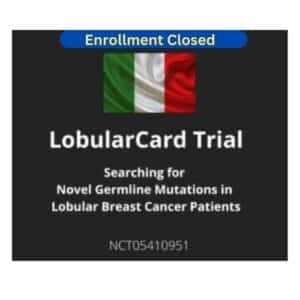Name of Trial/NCT#: LobularCard: NCT05410951
Summary: With this project we will aim to identify the frequency of 113 germline variants in lobular breast cancer patients.
Eligible patients: Women with lobular breast cancer in situ (LCIS) or invasive lobular breast cancer with or without a family history of breast tumors. (Patients must be enrolled at the IEO or must receive clinical evaluation to enroll at the IEO.)
Why is this study beneficial?/Important? We hypothesize that there are other genes in addition to CDH1 that may be associated with a susceptibility for lobular breast cancer predisposition and that novel genetic factors should be described, especially in patients with early onset of lobular breast cancer. In this context we selected a recent panel including 113 genes from the “Illumina” protocol.*
Background: Pathogenic or likely pathogenic variants (commonly referred to as mutations) in high-penetrance breast cancer susceptibility genes increase the risk of breast cancer more than fourfold. Germline mutations in BRCA1 or BRCA2 (BRCA1/2) are found in 3% to 4% of all women with breast cancer, including 10%-20% of those with triple-negative breast cancer and 10%-15% of Ashkenazi Jewish women with breast cancer. Recent international guidelines consider only a small group of genes as high-penetrance risk: BRCA1/2, CDH1, PTEN, and PALB2. The remaining are classified as moderate, low-penetrance risks.
There are no specific associations between these germline mutations and breast cancer histology. In accordance with recent genetic results reported in the literature, lobular histology is associated with a specific CDH1 germline pathway.
Invasive lobular breast carcinoma represents 10-15% of all invasive breast tumors. Lobular breast cancer presents relevant differences in the transcriptomic profiles, metastatic pattern, and clinical behavior compared to infiltrating ductal breast cancer. CDH1 germline loss-of-function mutations are associated with hereditary lobular breast cancer. The cumulative risk of lobular breast cancer for women with a CDH1 mutation is estimated to be 42% (95% CI 23% to 68%) by the age of 80, when it is a component of Hereditary Diffuse Gastric Cancer syndrome. To date, the CDH1 gene represents the unique genetic factor associated exclusively with lobular breast cancer. Its germline mutation frequency is estimated around 3-4%. However, this genetic risk is insufficient to clarify the cancer predisposition for lobular breast cancer. We hypothesize that other genes are involved in lobular breast cancer familial risk. In the proposed study, we will assign patients with diagnosed lobular breast cancer to an extended gene panel in order to identify other genes associated with lobular breast cancer predisposition.
Clinical Trial Location(s): European Institute of Oncology, Milan, Italy (IEO)
Principal Investigator: Giovanni Corso
Contact: giovanni.corso@ieo.it
More Information: https://clinicaltrials.gov/ct2/show/NCT05410951
*Genes that will be studied include: ACD, DIS3L2, GREM1, PIK3CA, SDHD,,AIP, EPCAM, HOXB13, PMS2, SLX4,,AKT1, ERCC1, KIF1B, POLD1, SMAD4, APC, ERCC2, KIT, POLE, SMARCA4, ATM, ERCC3, LZTR1, POT1, SMARCB1, BAP1, ERCC4, MAX, PRKAR1A, SMARCE1, BARD1, ERCC5, MEN1, PTCH1, SPINK1, BLM, FAM175A, MET, PTEN, SPRED1, BMPR1A, FANCA, MITF, RAD50, STK11, BRCA1, FANCB, MLH1, RAD51, SUFU, BRCA2, FANCC, MRE11A, RAD51B, TERF2IP, BRIP1, FANCD2, MSH2, RAD51C, TERT, CASR, FANCE, MSH3, RAD51D, TMEM127, CDC73, FANCF, MSH6, RB1, TP53, CDH1, FANCG, MUTYH, RECQL4, TSC1, CDK4, FANCI, NBN, RET, TSC2, CDKN1B, FANCL, NF1, RHBDF2, VHL, CDKN2A, FANCM, NF2, RINT1, WT1, CEBPA, FH, NSD1, RUNX1, XPA, CHEK2, FLCN, NTHL1, SDHA, XPC, CTRC, GALNT12, PALB2, SDHAF2, XRCC2, DDB2, GATA2, PDGFRA, SDHB, DICER1, GPC3, PHOX2B, SDHC.
The Lobular Breast Cancer Alliance (LBCA) shares information about ongoing clinical trials for lobular breast cancer. LBCA does not sponsor or run the clinical trials, and the scientific validity and safety of the trials is the responsibility of the trial investigators. Learn more by directly contacting the clinical trial coordinators listed.
Patients should always discuss their participation in any clinical trial directly with their doctor. Questions to Ask your Doctor may help. Learn more about participating in clinical trials. Learn about other lobular breast cancer clinical trials and studies.

